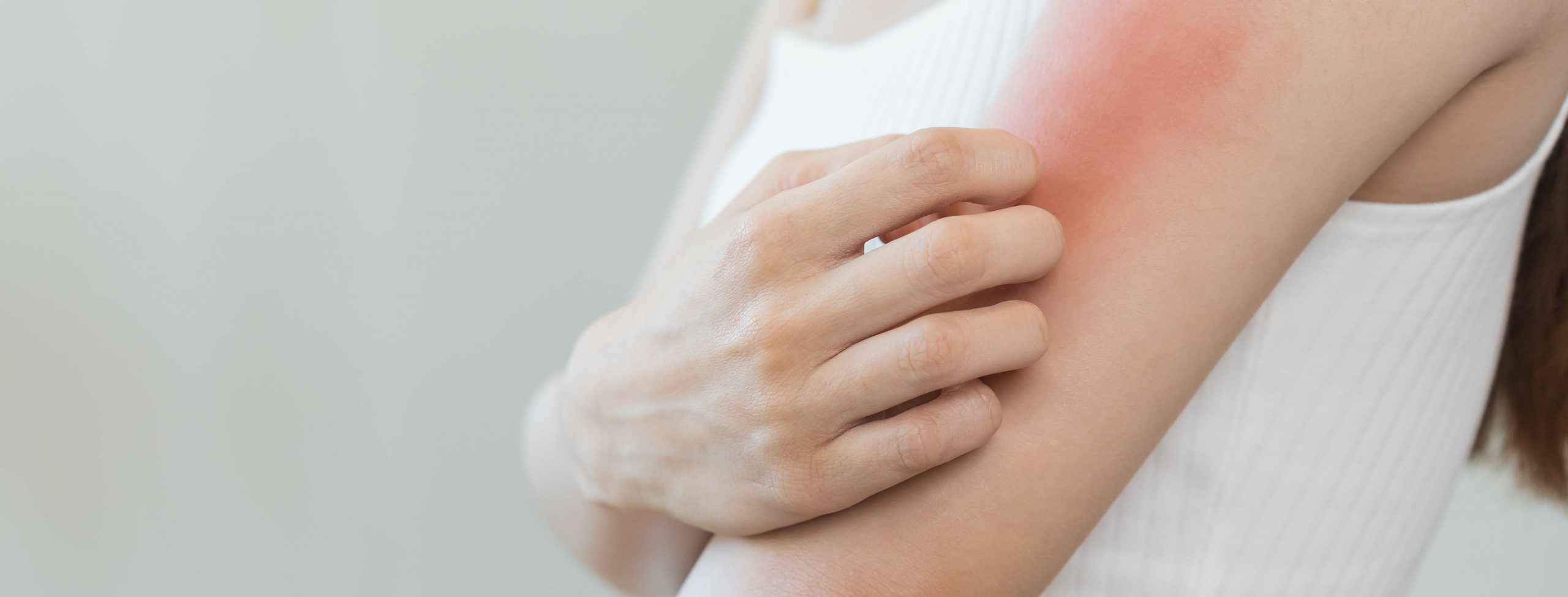Perimenopause itchy skin can be an unwelcome companion during this transitional phase of life. As you cope with the changes that come with perimenopause, dealing with persistent itching can become a daily struggle. Rest assured that you are not alone in this experience. Itchy skin is a common symptom that many perimenopausal women report and it affects their overall well-being.
Imagine going about your day, but the constant itching on your skin interferes with your focus and comfort. Studies show that a significant percentage of women, around 70%, experience skin problems during perimenopause, with dryness and itchiness being the main concerns.
However, there is no need to despair. In this article, we’ll delve into the intricacies of perimenopause itchy skin, uncover its underlying causes and provide you with seven effective solutions to ease the discomfort and restore balance to your skin. Say goodbye to annoying itching and regain a sense of calm and confidence in perimenopause.
Understanding Itchy and Dry Skin during Perimenopause
During perimenopause, hormonal changes can have a significant impact on the skin, leading to symptoms such as itchy and dry skin. One of the main causes is the decline in oestrogen levels. Oestrogen plays a crucial role in maintaining the hydration and elasticity of the skin. When oestrogen levels drop, the skin’s ability to retain moisture decreases, leading to dryness.
There are also changes in collagen and elastin levels during perimenopause. These proteins are responsible for the structure and elasticity of the skin. Reduced production can make the skin drier, less supple and more prone to sensitivity and irritation. This decrease in collagen and elastin can contribute to the itching that occurs during perimenopause.
Several triggers can make itchy and dry skin worse during this phase. Hormonal fluctuations, which are common during perimenopause, can disrupt the skin’s balance and trigger skin problems. In addition, allergies or increased sensitivity of the skin can develop as the body undergoes changes. Certain environmental factors such as harsh soaps, hot water or dry climates can exacerbate itching and dryness.
It is important to know that experiences can vary from person to person and that the severity of symptoms can vary from person to person. Understanding the causes of itchy and dry skin in perimenopause will help you identify the factors contributing to your skin problems and look for appropriate solutions to provide relief.
7 effective solutions to relieve itchy and dry skin in perimenopause
Solution 1# Hydration and Moisturization

To combat itchy and dry skin during perimenopause, one of the basic solutions is to focus on hydration and moisturisation. Adequate hydration starts from the inside, so it is important to drink enough water throughout the day. Adequate hydration helps to replenish the body’s moisture levels and contributes to healthier skin.
In addition to internal hydration, using moisturisers specifically designed for perimenopausal skin can provide much-needed relief. Look for moisturisers that contain ingredients such as hyaluronic acid, ceramides or glycerin, as these help to attract and retain moisture in the skin. Opt for fragrance-free products to minimise the risk of skin irritation.
Regular use of moisturisers, both in the morning and before bed, can help restore and maintain moisture levels in the skin. Pay attention to areas prone to dryness, such as the face, hands and body, and be sure to apply thoroughly and gently.
Solution 2# Gentle Cleansing and Skincare Routine

Adherence to a gentle cleansing and skin care routine is essential for managing itchy and dry skin during perimenopause. Harsh cleansers and skin care products with drying ingredients can strip the skin of its natural oils, exacerbating dryness and irritation. Opt for mild, fragrance-free cleansers specially formulated for sensitive or dry skin.
Use lukewarm water instead of hot water when cleansing, as hot water can contribute to dry skin. Gently massage the cleanser into your skin, then rinse thoroughly and pat dry with a soft towel. Avoid rubbing your skin vigorously as this may cause further irritation.
A consistent skin care routine is important. Apply a moisturiser after cleansing while your skin is still slightly damp to lock in moisture. Look for products that contain moisturising ingredients like hyaluronic acid or ceramides. If you have specific problems, such as perimenopausal skin changes, include targeted skin care products in your routine, such as serums or creams for mature skin.
Do not forget to protect your skin from the sun’s harmful rays. Apply a broad-spectrum sunscreen with at least SPF 30 daily, even on cloudy days. Sun protection helps prevent further damage and maintain the health of the skin.
Solution 3# Nourishing Diet and Supplements

A balanced and nutrient-rich diet plays an important role in supporting skin health during perimenopause. Nutrient-rich foods can provide your body with the vitamins and minerals it needs to fight dryness and itchiness from the inside out.
Consume foods high in omega-3 fatty acids, such as fatty fish (salmon, mackerel), walnuts and chia seeds. These healthy fats help maintain skin hydration and reduce inflammation.
Vitamin E, found in foods such as avocados, almonds and spinach, acts as an antioxidant, protecting the skin from oxidative damage and keeping it moist.
To support collagen production and promote skin elasticity, consume foods rich in vitamin C, such as citrus fruits, strawberries and peppers. Vitamin C is important for collagen synthesis, which helps keep the skin supple and firm.
In addition, lean protein sources such as poultry, lean meat and legumes provide the amino acids necessary for collagen formation.
Consult a doctor or nutritionist for individual advice on how to incorporate supplements into your routine. Omega-3 fatty acid supplements and vitamin E capsules can further support perimenopausal skin health.
Also Check – Nutrition and Diet Tips for Perimenopausal Women
Solution 4# Techniques for itch relief
When it comes to relieving perimenopausal itching, there are several techniques you can try to soothe your skin.
One approach is to explore natural remedies. Cool compresses, made by dampening a soft cloth with cool water and placing it on the itchy areas, can provide immediate relief. The cool temperature helps to reduce inflammation and itching. In addition, soothing baths can be helpful. Adding colloidal oatmeal or baking soda to your bath water can soothe itchy skin and provide a soothing effect.
Over-the-counter anti-itch creams or lotions can also be effective. Look for products that contain ingredients such as menthol or camphor, which provide a cooling sensation and relieve itching. Moisturising creams or lotions containing oatmeal can also be soothing, as oatmeal has anti-inflammatory properties that can relieve itching.
When using any new product, it’s essential to follow the instructions provided and do a patch test to check for any potential allergic reactions.
Also Check – How to Manage Hot Flashes and Night Sweats During Perimenopause
Solution 5# Clothing and Fabric Choices

Thoughtful choice of clothing and fabrics can have a significant impact on itching and skin irritation during perimenopause.
To minimise skin irritation, choose breathable fabrics that allow good air circulation on the skin. Natural fibres such as cotton and linen are an excellent choice as they are lightweight and breathable, preventing moisture and heat build-up that can aggravate itching. These fabrics also absorb moisture from the skin, keeping you dry and comfortable.
Loose-fitting clothing can also help reduce friction and irritation. Avoid tight or restrictive clothing that can trap moisture on the skin and lead to increased itching. Instead, choose clothes with a relaxed fit that allows your skin to breathe.
Keep in mind that everyone’s sensitivity may vary and what works well for one person may not work for another. Pay attention to how your body reacts to different fabrics and clothing materials. If you notice that certain fabrics, such as synthetic materials or wool, cause increased itching or irritation, you should avoid them.
Also Check – Weight Gain in Perimenopause – Strategies for Manage Metabolic Changes
Solution 6# Manage stress levels

Managing stress is crucial to maintaining skin health in perimenopause. Stress can have a direct impact on the skin, exacerbating itching and other skin-related symptoms.
The relationship between stress and skin health is multifaceted. Stress triggers the release of stress hormones such as cortisol, which can disrupt the balance of other hormones in the body, including those that affect the skin. This hormonal imbalance can lead to increased oil production, inflammation and sensitivity, all of which contribute to skin problems such as itching and dryness.
To reduce stress and its effects on your skin, incorporate stress management techniques into your daily routine. Meditation and deep breathing exercises can help calm the mind and promote relaxation, reducing stress levels and thus improving skin health.
Regular physical activity such as yoga or other sports have been shown to be good for stress relief. Exercise releases endorphins, which are natural mood elevators and help reduce stress and provide a sense of well-being. Exercise also improves blood circulation, which provides oxygen and nutrients to the skin and promotes its overall health.
Activities that you enjoy and help you relax, such as spending time in nature, pursuing hobbies or socialising with loved ones, can also help relieve stress and have a positive effect on your skin.
Also Check – 5 Classic Yoga Asanas – Ignite Your Inner Glow in Perimenopause
Solution 7# Seek Professional Advice
If you have persistent skin problems during perimenopause, be sure to seek professional advice from a doctor or dermatologist. They can give you expert advice and tailor treatment options to your specific needs.
Emphasising the importance of consulting with a healthcare professional is essential because they can help determine the causes of your skin problems and recommend appropriate interventions. They will conduct a thorough examination, taking into account your medical history, symptoms and general health.
Based on their assessment, they may suggest medical interventions such as hormone replacement therapy (HRT). HRT can help rebalance hormone levels, including oestrogen, which can improve skin hydration and reduce itching. Your doctor will explain the possible benefits and risks of hormone replacement therapy so you can make an informed decision.
Prescription moisturisers or topical creams may also be recommended to treat persistent dryness and itching. These products contain highly effective ingredients that can provide more intense hydration and effectively relieve symptoms.
Also Check – Comprehensive Guide to Understand and Manage the Symptoms of Perimenopause
Now you have uncovered the secret of how to combat itchy and dry skin during perimenopause. With the seven effective solutions we have discussed, you can say goodbye to the irritation and discomfort that comes with this phase of life.
Remember, the key is to find the right balance. Hydrate your body from the inside out, pamper your skin with gentle cleansing and nourishing moisturisers, and make sure you eat a nutrient-rich diet. Do not forget to use stress-reduction techniques, exercise regularly and maintain a consistent skincare routine.

Leave a Reply